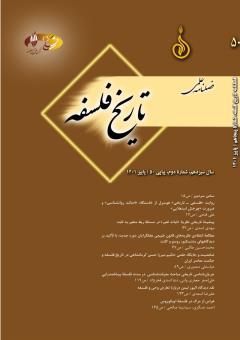روایت «فلسفی-تاریخی» هوسرل از خاستگاه «اصالت روانشناسی» و ضرورت «چرخش استعلایی»
محورهای موضوعی : ریشهشناسی مکاتب و آراء فلسفی در ادوار قدیم و جدید
1 - استادیار گروه فلسفه دانشکدگان فارابی دانشگاه تهران، قم، ايران
کلید واژه: پدیدارشناسی, اصالت روانشناسی, چرخش استعلایی, دکارت, لاک, کانت, هوسرل,
چکیده مقاله :
هوسرل در کتاب بحران علوم اروپایی کوشیده تا خاستگاه «اصالت روانشناسی» را در تاریخ فلسفة جدید نمايان سازد. «روانشناسی پدیدارشناسانه» نهتنها بنیادی برای «روانشناسی تجربی» فراهم میآورد، بلكه میتواند بمثابه مقدمه یی برای «پدیدارشناسی استعلایی» قرار گیرد. او در روایت فلسفی خود از سير تاريخي مفهوم اصالت روانشناسي، ما را به جان لاک ارجاع میدهد و بيان ميكند كه ديدگاههاي لاك را بارکلی و هیوم ادامه دادند. پژوهشهای روانشناختی لاك در خدمت مفهوم استعلایی درآمد که نخستین بار توسط دکارت در کتاب تأملات صورتبندی شده بود. بر اساس دیدگاه او، مابعدالطبیعه میتواند نشان دهد که تمام واقعیت و کل جهان و آنچه برای ما وجود دارد، چیزی جز اعمال شناختی ما نیست؛ اینجاست که توجه به «امر استعلایی» ضرورت مييابد. شک روشی دکارت، نخستین روش برای طرح «سوژة استعلایی» بود و توصیف او از «إگو کوگیتو» (منِ انديشنده) نخستین صورتبندی مفهومی از آن را فراهم ساخت. جانلاک «ذهن استعلایی محض» دکارت را با «ذهن بشر» جایگزین كرد، با این حال پژوهش خود را در زمينة ذهن بشری از طریق تجربة درونی بدليل یک دغدغة ناخودآگاهِ استعلایی ـ فلسفی ادامه داد، اما خواسته یا ناخواسته در دام جریان اصالت روانشناسی افتاد. هوسرل با نگاهي تاریخی و بنحوي كاملاً فلسفي نشان داد که چگونه بارقههای توجه به امر استعلایی برای نخستینبار در فلسفة دکارت و پس از آن در تقابل میان «مکتب اصالت عقل» و «مکتب اصالت تجربه» ظهور مييابد و در ادامه با نشو و نمای آن در فلسفة استعلایی کانت، امکانات نهایی آن در فلسفة پدیدارشناسانة هوسرل به ثمر مینشیند.
In the Crisis of European Sciences and Transcendental Phenomenology, Husserl has tried to disclose the origin of psychologism in the history of modern philosophy. Phenomenological psychology not only provides a basis for empirical psychology but can also function as an introduction to transcendental phenomenology. In his philosophical narration of the historical development of the concept of psychologism, Husserl refers to John Locke and states that Barkley and Hume advocated Locke’s views. Locke’s psychological studies come at the service of transcendental concept, which had been formulated by Descartes in his Meditations on First Philosophy for the first time. In his view, metaphysics can show that the whole reality of the world and everything that exists is nothing more than our cognitive acts. It is at this point that it is necessary to pay attention to transcendental affairs. Descartes’ methodological skepticism was the first method used for posing the transcendental subject, and his description of cogito ergo (I think) provided the first conceptual formulation for it. John Locke replaced the pure transcendental mind of Descartes with the human mind. Nevertheless, he continued his study of the human mind through intrinsic experience because of an unconscious transcendental-philosophical concern. However, knowingly or unknowingly, he fell in the trap of psychologism. Following a historical and, in a way, completely philosophical approach, Husserl showed how the rays of attention to transcendental affairs emerged for the first time in Cartesian philosophy and, then, in the conflict between rationalism and empiricism. He also demonstrated how, after the growth of this attention in Kantian transcendental philosophy, it came to fruition in Husserl’s phenomenological philosophy.
ارسطو (1385) متافیزیک (مابعدالطبیعه)، ترجمة شرفالدین خراسانی، تهران: حکمت.
اسمیت، دیوید وودراف (1393) هوسرل، ترجمة محمدتقی شاکری، تهران: حکمت.
پازوکی، بهمن (1399) درآمدی بر پدیدارشناسی هوسرل، تهران: مؤسسة پژوهشی حکمت و فلسفه ایران.
زهاوی، دان (1400) پدیدارشناسی هوسرل، ترجمة مهدی صاحبکار و ایمان واقفی، تهران: روزبهان.
کانت، ایمانوئل (1362) سنجش خرد ناب، ترجمة میرشمس¬الدین ادیب سلطانی، تهران: امیرکبیر.
کانت، ایمانوئل (1384) تمهیدات، ترجمة غلامعلی حدادعادل، تهران: مرکز نشر دانشگاهی.
فتحی، علی (1398) «درنگی در نقد هیدگر به مفهوم سوژه در متافیزیک کانت و هوسرل»، دو فصلنامه شناخت، دوره 12، شماره 2، ص 228 ـ 207.
Fink, E (2000) The Phenomenology of Husserl: selected critical readings. Chacago: Quadrangle Books, 70-139.
Husserl, Edmund (1960) Cartesian Meditations, Translated by Dorion Cairns. The Hague: Nijhoff.
Husserl, Edmund (1970) The Crisis of European Sciences and Transvendental Phenomenology. Translated by David Carr. Northwestern University Press.
Husserl, Edmund (1982) Ideas Pertaining to a Pure Phenomenology and to a phenomenological philosophy. Book1: General Introduction to a pure phenomenology. Translated by F. Kersten. The Hague: Nijhoff.
Kant, Immanuel (1998) Critique of Pure Reason. Translated by Guyer and Allen W Wood, Cambridge University Press.
Kant, Immanuel (1958) Critique of Pure Reason, Translated with an Introduction Norman Kemp Smith, The Modern Library New York.
Kockelmans, Josef J (1994) Edmund Husserl’s Phenomenology, Purdue University Press West Lafayette, Indiana.

